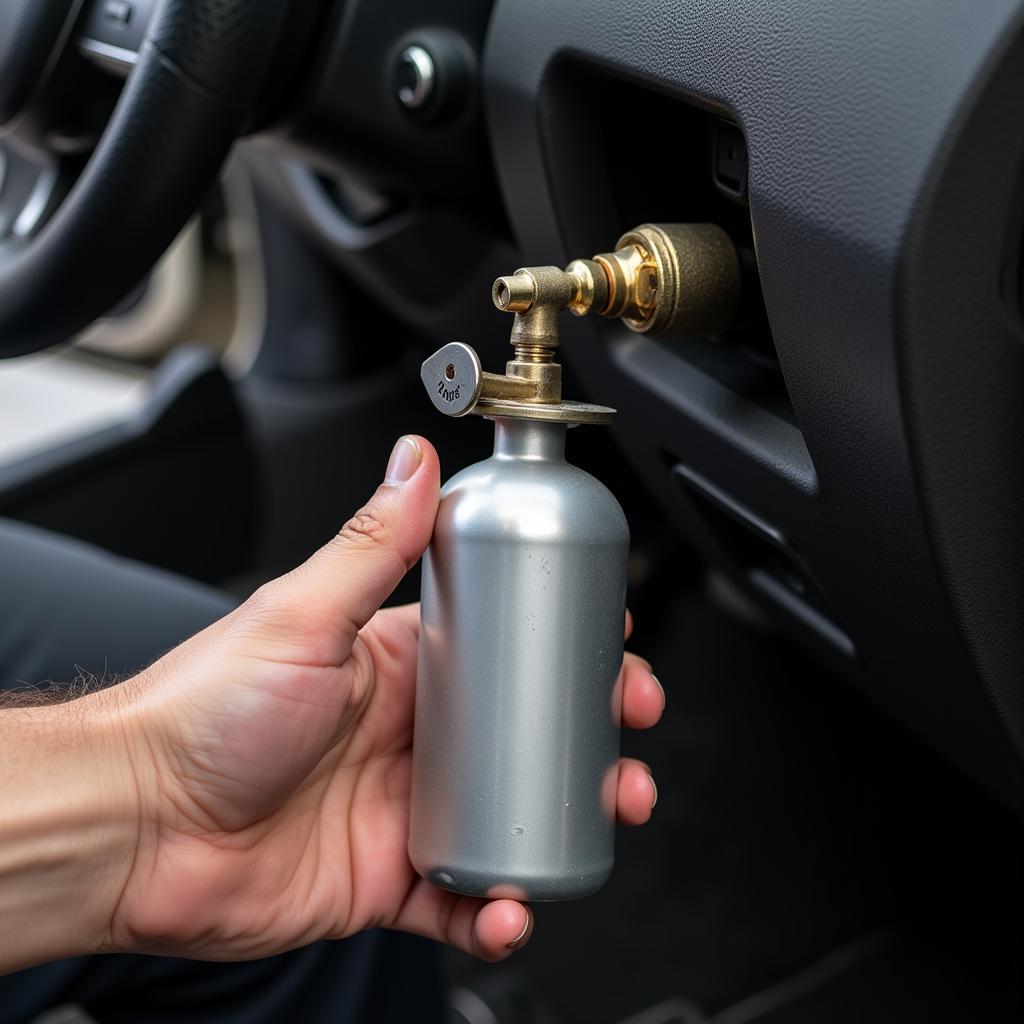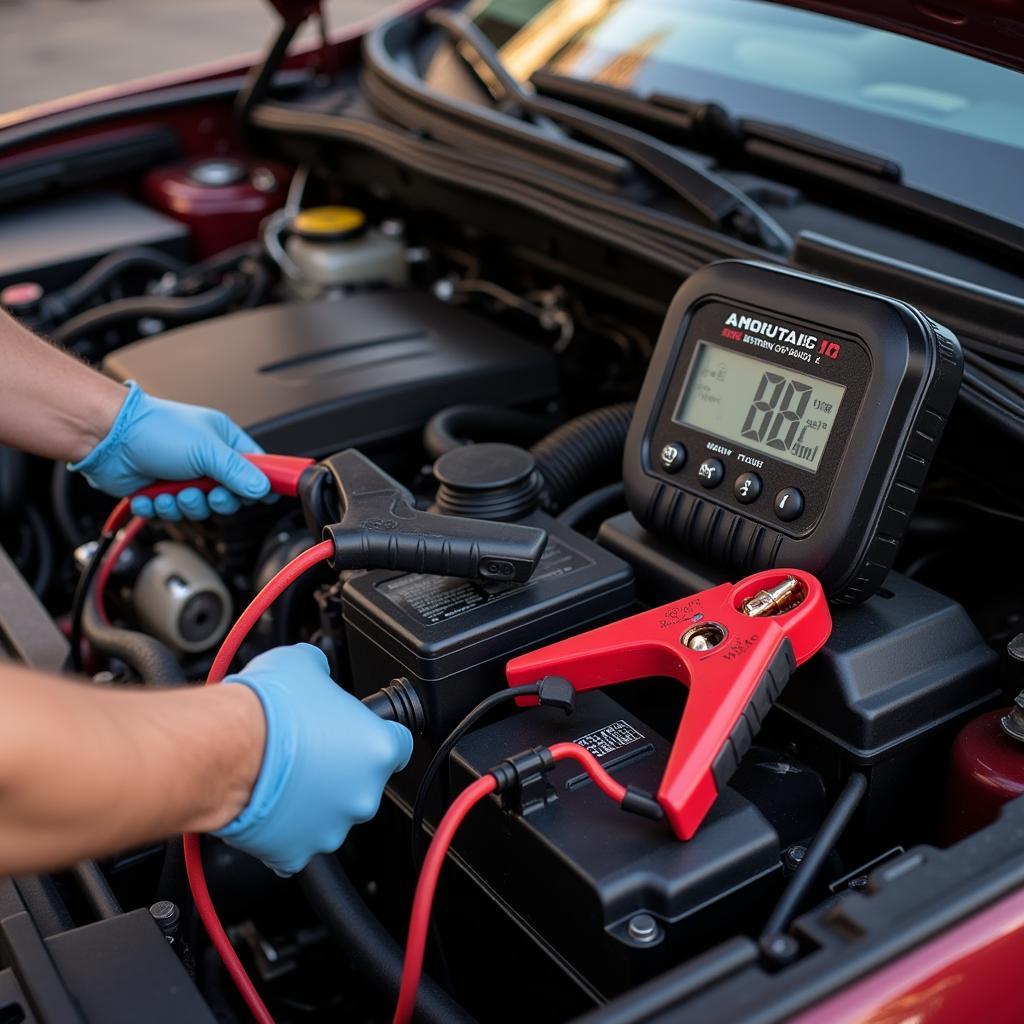Keeping your car cool during the scorching summer months is essential, and a properly functioning AC system is crucial for a comfortable driving experience. If you’re experiencing issues with your car’s AC, you might be wondering, “What Fluid Is Used To Fix Car Air Conditioner?”.
Let’s delve into the world of automotive AC systems and explore the vital fluid that keeps them running smoothly.
The Lifeblood of Your AC: Refrigerant
The magic fluid that makes your car’s AC system tick is called refrigerant. It’s a specially formulated substance that cycles through the AC system, absorbing heat from the inside of your car and releasing it outside. This process is based on the principles of thermodynamics and involves the refrigerant changing states from liquid to gas and back again.
 Car AC Refrigerant
Car AC Refrigerant
Not All Refrigerants Are Created Equal: Types and Environmental Impact
Over the years, different types of refrigerants have been used in car AC systems. The most common ones you might come across are:
- R-12 (Freon): This was the industry standard for many years but has been largely phased out due to its ozone-depleting properties.
- R-134a: This replaced R-12 and is still widely used in older vehicles.
- HFO-1234yf: This is the newest generation of refrigerant, designed to be more environmentally friendly with a lower global warming potential.
It’s important to know which type of refrigerant your car uses, as mixing different types can damage your AC system. You can usually find this information in your owner’s manual or on a sticker under the hood.
Why Does My Car AC Need Refrigerant?
Your car’s AC system is a sealed unit, but over time, small amounts of refrigerant can leak out. Low refrigerant levels will reduce your AC’s cooling capacity, resulting in lukewarm air blowing from the vents.
Common causes of refrigerant leaks include:
- Worn-out seals and hoses: Over time, the rubber components in your AC system can crack and deteriorate, leading to leaks.
- Corrosion: Exposure to moisture and road salt can corrode AC components, causing leaks.
- Accidental damage: Accidents or debris impact can damage AC lines and result in refrigerant loss.
Don’t DIY This One: The Importance of Professional AC Service
While you might be tempted to purchase a refrigerant recharge kit and tackle the problem yourself, it’s crucial to emphasize that working with refrigerants requires specialized knowledge and equipment.
Here’s why it’s best to leave AC repairs to the professionals:
- Safety First: Refrigerants are hazardous materials that can cause frostbite or other injuries if mishandled.
- Accurate Diagnosis: A professional mechanic can accurately diagnose the root cause of the problem, whether it’s a simple refrigerant leak or a more complex issue.
- Environmentally Responsible: Properly trained technicians have the equipment and expertise to handle refrigerant safely and prevent it from harming the environment.
Finding a Trustworthy Mechanic: Where Do They Fix AC in Cars?
You can find qualified AC repair shops in several places. Consider asking friends and family for recommendations or checking online reviews.
Here are some options for where to get car air conditioner fixed:
- Dealerships: Dealerships often have technicians specializing in your car’s make and model, but their services might be pricier.
- Independent Auto Repair Shops: These shops can provide quality repairs at a more competitive price. Look for shops that specialize in AC work or have ASE-certified technicians.
- Chain Auto Repair Shops: Chain shops offer convenience and often have promotional deals, but the quality of service can vary.
Beyond Refrigerant: Other AC Maintenance Essentials
While refrigerant is the key to a functioning AC system, other components require attention during regular maintenance:
- AC Compressor: This is the heart of the system, responsible for compressing and circulating the refrigerant.
- Condenser: Located at the front of your vehicle, the condenser cools the refrigerant, converting it from a gas to a liquid.
- Evaporator: Positioned inside the dashboard, the evaporator absorbs heat from the cabin air.
- Receiver/Drier: This component stores refrigerant and removes moisture from the system.
- Cabin Air Filter: Just like your home’s air filter, this filter removes dust, pollen, and other contaminants from the air entering your car’s cabin.
Regularly servicing your AC system and replacing worn-out components can prevent costly repairs down the road.
FAQs About Car AC and Refrigerant
How often should I recharge my car’s AC?
It’s not uncommon for car AC systems to lose a small amount of refrigerant over time. It’s generally recommended to have your AC system checked for leaks and recharged every 2-3 years or if you notice a decrease in cooling performance.
Can I mix different types of refrigerant?
No, mixing different refrigerants is not recommended and can damage your AC system. Always consult your owner’s manual or a qualified mechanic to determine the correct refrigerant for your vehicle.
How much does it cost to fix a car AC leak?
The cost of repairing a car AC leak can vary depending on the location and severity of the leak, the type of refrigerant used, and the labor rates in your area. On average, you can expect to pay anywhere from $150 to $500 or more for AC leak repairs.
Do they change cabin filter when fixing ac in car? Often, mechanics will offer cabin air filter replacement as part of an AC service package.
How can I tell if my car’s AC needs refrigerant?
Several signs indicate your car’s AC might be low on refrigerant:
- Warm air blowing from the vents
- Weak airflow, even on the highest fan setting
- A hissing or bubbling sound coming from the AC system
- Ice forming on the AC lines or compressor
If you experience any of these symptoms, it’s essential to have your AC system inspected by a professional.
Keep Your Cool with Regular AC Maintenance
Your car’s AC system is a complex network of components working in harmony to keep you comfortable on the road. Understanding the importance of refrigerant and seeking professional help for AC repairs and maintenance are essential steps in ensuring a cool and enjoyable driving experience, especially during the hottest months of the year.
Need help with your car’s AC? Contact AutoTipPro today at +1 (641) 206-8880 or visit our office at 500 N St Mary’s St, San Antonio, TX 78205, United States. Our team of expert technicians is here to keep you cool and comfortable on the road.






Leave a Reply